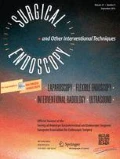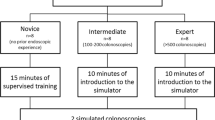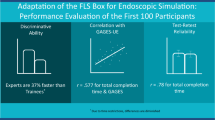Abstract
Background: The aim of this study was to investigate the relation between clinical experience and performance with regard to colonoscopic procedures performed on the HT Immersion Medical Colonoscopy Simulator. The hypothesis is that the performance of novice, intermediate, and experienced operators is different on simulators, just as it is on real patients. Methods: 25 Postgraduate doctors were recruited and divided into three groups according to their level of colonoscopic experience. Candidates were asked at random to perform colonoscopy on module 3 or 4 of the HT Immersion Medical Colonoscopy Simulator. Modules 3 and 4 have built-in complex loops, and can demonstrate the candidate’s ability either to avoid or undo the loop. Candidates in the first group, termed “novice,” each had performed fewer than 10 colonoscopies and included four preregistration house officers (PRHOs), five specialist trainee resistrars (SpRs) and two consultants. This novice group had completed 80 episodes among them. In the second group, termed “intermediate,” each candidate had performed between 11 and 100 colonoscopies, and the candidates included five SpRs and two research fellows. This intermediate group had completed 65 episodes. Members of the third group, termed “experienced” each had performed more than 101 colonoscopies, and included one SpR and six consultants. This experienced group had completed 45 episodes between them. A time result of 3,600 s (1 h) was used to denote perforation. Results: The experienced group were shown to perform better than the intermediate group, which in turn performed better than the novice group. The assessment was based on multiple factors including time taken to complete the test, percentage of the colonic mucosa visualized, incidence of colonic perforations, and path length used. The results were highly significant statistically for all these factors (p < 0.000) except in path length used. Conclusions: This study demonstrated that operators who differ in terms of their clinical experience and technical ability also differ in their performance of simulated colonoscopy. Thus, the findings have shown the simulator technology to be a powerful discriminator of manipulative skills in colonoscopy. The clinical differences that exist between novices and experts in terms of experience and technical expertise in endoscopic procedures are reflected by statistically significant differences in performance on the simulator. It is therefore reasonable to argue that improving proficiency on the simulator may translate into improvements in clinical practice. This study has validated the use of the HT Medical Immersion Colonoscopy Simulator to discriminate among subjects with different levels of experience.







Similar content being viewed by others
References
InstitutionalAuthorNameAmerican Society for Gastrointestinal Endoscopy (1999) ArticleTitlePriniciples of training in gastrointestinal endoscopy. Gastrointest Endosc 49 Occurrence Handle1:STN:280:DyaK1M7isVKltA%3D%3D Occurrence Handle9925703
KC Calman JG Temple (1999) ArticleTitleReforming higher specialist training in the United Kingdom. Med Educ 33 28–33 Occurrence Handle1:STN:280:DyaK1M3islOhsg%3D%3D
A Chaudhry C Sutton (1999) ArticleTitleLearning rate for laparoscopic surgical skills on MST-VR: quality of human computer–interface. Ann R C Surg Engl 81 281–286 Occurrence Handle1:STN:280:DC%2BD3c%2Fot1SlsQ%3D%3D
Joint Committee on Higher Medical Training of the Royal College of Physicians, United Kingdom
T McCashland R Brand (2000) ArticleTitleThe time and financial impact of training fellows in endoscopy. Am J Gastroenerol 95 3129–3132 Occurrence Handle1:STN:280:DC%2BD3M%2FnsFKjsQ%3D%3D
SS McNatt CD Smith (2001) ArticleTitleA computer-based laparoscopic skills assessment device differentiates experienced and novice laparoscopic surgeons. Surg Endosc 15 1085–1089 Occurrence Handle1:STN:280:DC%2BD3MnotV2jtw%3D%3D
NJ Taffinder S Smith (1999) ArticleTitleCan a computer measure surgical precision? Surg Endosc 13 IssueIDSuppl 1 81 Occurrence Handle10.1007/s004649901107
Author information
Authors and Affiliations
Rights and permissions
About this article
Cite this article
Mahmood, T., Darzi, A. A study to validate the colonoscopy simulator . Surg Endosc 17, 1583–1589 (2003). https://doi.org/10.1007/s00464-002-9222-y
Published:
Issue Date:
DOI: https://doi.org/10.1007/s00464-002-9222-y




